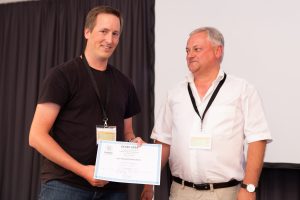International Software Testing Education Workshop (TestEd), IEEE, 2020, Can Learning Formal Specification Be Fun? – Experience and Perspective
Wishnu Prasetya, Craig Leek, Roan Oosenbrug, Petar Kostic, Mike de Vries
Writing formal specifications is a useful skill for students to develop and to grow a positive mindset towards it. Unfortunately this is hampered by the stereotyping of formal method as dry and boring. In this short paper we discuss our experience in using of a computer game called FormalZ as an attempt to introduce some fun in teaching the skill. Two setups are discussed: as an embedded part of a course, and as a loose tutorial, after which we will conclude with the lessons learned.
Download the paper here.
I. S. W. B. Prasetya, C. Q. H. D. Leek, R. Oosenbrug, P. Kostic and M. d. Vries, “Can Learning Formal Specification Be Fun? —Experience and Perspective,” 2020 IEEE International Conference on Software Testing, Verification and Validation Workshops (ICSTW), Porto, Portugal, 2020, pp. 437-440, doi: 10.1109/ICSTW50294.2020.00078.
International Software Testing Education Workshop (TestEd), IEEE, 2020, Teaching Software Testing with the Code Defenders Testing Game: Experiences and Improvements
Gordon Fraser, Alessio Gambi, José Miguel Rojas.
Code Defenders is a game that aims to engage students with software testing. Players compete over a Java class under test by producing tests and mutants, i.e., artificial faults, scoring points if tests reveal mutants, or mutants survive tests. While initially created as a fun way to introduce students to testing in one-off fun sessions, we have moved to integrating the game as an assessed core component of a software testing course. This has shown great potential in engaging students, but many challenges have been revealed as part of this integration. In this paper we describe how we integrated Code Defenders into a software testing course, and how we improved the game in order to address the resulting challenges.
Download the paper here.
Gordon Fraser, Alessio Gambi, José Miguel Rojas. “Teaching Software Testing with the Code Defenders Testing Game: Experiences and Improvements,” In Proc. 1st International Software Testing Education Workshop (TestEd), IEEE, 2020.
CSEE&T’2020 Paper: Quizzes (As a Tool for Self-Regulated Learning) in Software Engineering Education
José Bernardo Rocha, Luis Felipe Coimbra Costa, Rui Prada, António Rito Silva, Daniel Gonçalves, Pedro Correia
Nov 9-12, 2020, Munich, Germany (held online)
This paper discusses how quizzes are applied within the field of software engineering learning and how quizzes can help self-regulate student learning. For this, a systematic mapping that selected the most relevant studies on the use of quizzes in education was performed, aiming to clarify their relationships and mutual impacts. Our analysis shows that student engagement and quiz work is a prominent learning solution for increasing motivation in and out of the classroom. We found that quizzes can be applied in software engineering and through generic quizzes, online Quizzes, pop-Quizzes, gamified Quizzes, quiz games, or, alternatively, as an exercise in creating quizzes. However, we did not find approaches to the use of quizzes, explicitly containing Zimmerman’s cyclic model, only some of the model’s activities in isolation and not explicitly. We argue that sharing the quizzes will raise the potential for them to be used as a self-regulation tool in software engineering education. We describe the steps taken by a Software Engineering Gamification project to create an effective tool for creating and sharing software engineering quizzes. Our next requirement to be implemented in the project will be the application of self-regulation of learning containing the three phases of the Zimermman cyclic model.
Download the paper here, get the slides here, and check the presentation here.
José Bernardo Rocha, Luis Felipe Coimbra Costa, Rui Prada, António Rito Silva, Daniel Gonçalves, Pedro Correia. “Quizzes (As a Tool for Self-Regulated Learning) in Software Engineering Education” In Proceedings of the 32nd Conference on Software Engineering Education and Training (CSEE&T), pp. 1-10, Munich, Germany, 2020. IEEE. DOI: 10.1109/CSEET49119.2020.9206235
Development and Evaluation of E-assessment platform based on Multiple Choice Questions
Pedro Miguel Póvoa Correia, MSc Thesis
Oct 2, 2020, Lisbon, Portugal
This thesis describes the development and evaluation of an E-assessment system, used in several university courses, that focuses on multiple-choice questions. The goal is to provide students with faster feedback by giving them self-assessment tools and consequently improve their motivation and
engagement with the course. On the other hand, teachers shall receive detailed result information and quiz management tools that power the student usage. The design of the system is based on established feedback principles from E-assessment and Multiple Choice Question literature and inspired by existing Learning Management Systems that utilize multiple-choice questions. The system’s handling and usage by students is then evaluated to ascertain student performance increases and motivation improvements.
Download the full thesis here and short paper here.
Pedro Correia, Development and Evaluation of E-assessment platform based on Multiple Choice Questions, MSc Thesis, Instituto Superior Técnico, Universidade de Lisboa. Supervisors: António Rito Silva, Rui Prada. October 2020.
PROFES’19 paper: Improving Engagement in Software Engineering Courses through Gamification
Nov 27 – 29, 2019, Barcelona, Spain
Software Engineering courses play an important role for preparing students with the right knowledge and attitude for software development in practice. The implication is far reaching, as the quality of the software that we use ultimately depends on the quality of the people that make them. Educating Software Engineering, however, is quite challenging, as the subject is not considered as most exciting by students, while teachers often have to deal with exploding number of students. The EU project IMPRESS seeks to explore the use of gamication in educating software engineering at the university level to improve students’ engagement and hence their appreciation for the taught subjects. This paper presents the project, its objectives, and its current progress.
Download the paper here.
Tanja E. J. Vos, I. S. W. B. Prasetya, Gordon Fraser, Iván Martínez-Ortiz, Iván J. Pérez-Colado, Rui Prada, José Rocha, António Rito Silva: IMPRESS: Improving Engagement in Software Engineering Courses Through Gamification. PROFES 2019: 613-619
1st Serious Games Experience
Nov 21 – 22, 2019, Cordoba, Spain
The Erasmus+ IMPRESS project was presented as one of the success stories of the use of serious games and learning analytics in university education. This presentation was made as part of the presentation about research on serious games made by Professor Baltasar Fernandez-Manjon at the 1st Serious Game Experience event organized by the Goverment of the Andalucía region and held in Cordoba on 21 and 22 November 2019. More than 450 people from academia and industry participated in this event.
Download the slides here.
Union Iberoamericana de Universidades Summer School
Oct 16-18 2019, Buenos Aires, Argentina
The IMPRESS Project was presented by Prof Baltasar Fernandez-Manjon at the Union Iberoamericana de Universidades Summer School “Nuevas generaciones, nuevas tecnologías. La enseñanza en el nivel superior y los desafíos del escenario digital” held in Buenos Aires from 16 to 18 October 2019. Union Iberoamericana de Universidades is a higher education consortium created by Universidad de Barcelona (Spain), Universidade de Sao Paulo (Brasil), UNAM (Mexico), Universidad de Buenos Aires and Universidad Complutense de Madrid to improve university education and where the use of educational technology plays a key role. In this summer school, more than 60 researchers from the five universities discuss the possibilities offered by different educational technologies in general and by serious games and game learning analytics in particular.
Download the slides here.
X BRAZILIAN CONFERENCE ON SOFTWARE: THEORY AND PRACTICE
September 23, 2019, Salvador, Brazil
The Brazilian Conference on Software: Theory and Practice (CBSoft) is an annual event promoted by the Brazilian Computer Society (SBC), aiming at promoting and encouraging the exchange of experiences among researchers and practioneers from the industry and academia on the latest research, trends and innovations – practical and theoretical – concerning software.
https://cbsoft2019.ufba.br/#/sastkeynotes
Talk:Gamifying Software Testing
Writing good software tests is difficult and not every developer’s favourite occupation. If an activity is so difficult, boring, or otherwise unattractive that people do not want to engage with it, then gamification offers a solution: By turning the activity into a fun and competitive task, participants engage, compete, and excel. In this talk, I will explore how this idea can be applied to software testing. Our ongoing work with the Code Defenders game demonstrates that players engage with testing, and perceive it as a fun activity. At the same time, by participating in the game, players produce test suites that are far superior to anything automated testing tools generate. This illustrates the potential of using gamification to address some of the many problems that we are facing today in software testing. There are, however, many challenges ahead, and I will outline some of the challenges and research opportunities related to gamifying software testing.
ICSE’19 paper: Having Fun in Learning Formal Specifications
May 27 – 27, 2019, Montreal, Quebec, Canada
There are many benefits in providing formal specifications for our software. However, teaching students to do this is not always easy as courses on formal methods are often experienced as dry by students. This paper presents a game called FormalZ that teachers can use to introduce some variation in their class. Students can have some fun in playing the game and, while doing so, also learn the basics of writing formal specifications in the form of pre- and post-conditions. Unlike existing software engineering themed education games such as Pex and Code Defenders, FormalZ takes the deep gamification approach where playing gets a more central role in order to generate more engagement. This short paper presents our work in progress: the first implementation of FormalZ along with the result of a preliminary users’ evaluation. This implementation is functionally complete and tested, but the polishing of its user interface is still future work.
Get the paper here.
I. S. W. B. Prasetya, Craig Q. H. D. Leek, Orestis Melkonian, Joris ten Tusscher, Jan van Bergen, J. M. Everink, Thomas van der Klis, Rick Meijerink, Roan Oosenbrug, Jelle J. Oostveen, Tijmen van den Pol, and Wink M. van Zon. 2019. Having fun in learning formal specifications. In Proceedings of the 41st International Conference on Software Engineering: Software Engineering Education and Training (ICSE-SEET ’19). IEEE Press, Piscataway, NJ, USA, 192-196. DOI: https://doi.org/10.1109/ICSE-SEET.2019.00028
EDUCON’19 paper: From Heterogeneous Activities to Unified Analytics Dashboards.
9 and 11 April 2019 Dubai, United Arab Emirates
Teachers often wish to integrate activities from disparate sources into their courses. For example, gamified activities, mediated through technology, can promote the type of active learning required to develop higher-level engagement by students. However, unless the activities have been designed to facilitate it, integrating their analytics into a single dashboard can require significant development effort. A general solution to such heterogeneous analytics integration can be of great value, by presenting a single view of student actions throughout the different parts of a course. We describe the problems presented when integrating the analytics of three heterogeneous stand-alone activities, in the context of a EU project to improve software engineering teaching. The idea is to increase student engagement via gamification, and explore the design space of possible solutions for providing integrated analytics over the heterogeneous activities. We then describe the design of a proof-of-concept implementation, based on the use of both xAPI trackers and simple CSV files for information exchange, single sign-on, a minimal class management web application, and updates to the analytics platform to allow dynamic changes in the multi-level analysis. The resulting approach can be readily applied to similar heterogeneous scenarios.
Get the paper here.
I. Martínez-Ortiz, I. Pérez-Colado, D. C. Rotaru, M. Freire and B. Fernández-Manjón, “From Heterogeneous Activities to Unified Analytics Dashboards,” 2019 IEEE Global Engineering Education Conference (EDUCON), Dubai, United Arab Emirates, 2019, pp. 1108-1113.
doi: 10.1109/EDUCON.2019.8725222
SIGCSE’19 Paper: Gamifying a Software Testing Course with Code Defenders.
February 27th – March 2nd, Minneapolis, Minnesota, USA
Software testing is an essential skill for software developers, but it is challenging to get students engaged in this activity. The Code Defenders game addresses this problem by letting students compete over code under test by either introducing faults (“attacking”) or by writing tests to reveal these faults (“defending”). In this paper, we describe how we integrated Code Defenders as a semester-long activity of an undergraduate and graduate level university course on software testing. We complemented the regular course sessions with weekly Code Defenders sessions, addressing challenges such as selecting suitable code to test, managing games, and assessing performance. Our experience and our data show that the integration of Code Defenders was well-received by students and led them to practice testing thoroughly. Positive learning effects are evident as student performance improved steadily throughout the semester.
Download the paper here.
Gordon Fraser, Alessio Gambi, Marvin Kreis, and José Miguel Rojas. 2019. Gamifying a Software Testing Course with Code Defenders. In Proceedings of the 50th ACM Technical Symposium on Computer Science Education (SIGCSE ’19). ACM, New York, NY, USA, 571-577. DOI: https://doi.org/10.1145/3287324.3287471
ECSEE’18 paper: A Preliminary Report on Gamifying a Software Testing Course with the Code Defenders Testing Game.
June 14 – 15, 2018, Bavaria, Germany
It is challenging to teach software testing in a way that is engaging for students, and to ensure that they practice effective testing sufficiently. Code Defenders is an educational game that is intended to address this problem: Students compete over code under test by either introducing faults (“attacking”) or by writing tests (“defending”). We have integrated Code Defenders as a mandatory component of a software testing course at the University of Passau, which featured ten game sessions of two hours each and involved 120 students. In this paper, we describe how this integration took place and provide some initial insights into our experiences. Code Defenders and the course material are freely available, allowing others to replicate this setup and to gamify their own testing courses.
Presentation of the following paper publication:
Gordon Fraser, Alessio Gambi, and José Miguel Rojas. 2018. A Preliminary Report on Gamifying a Software Testing Course with the Code Defenders Testing Game. In Proceedings of the 3rd European Conference of Software Engineering Education (ECSEE’18). ACM, New York, NY, USA, 50-54. DOI: https://doi.org/10.1145/3209087.3209103
First Multiplier event – 7 September 2018 – Utrecht
Introduction slides are here. Code-defenders slides can be found here. FormalZ slides can be found here. Below some photos from the event.
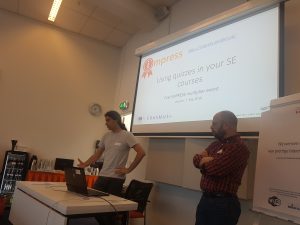
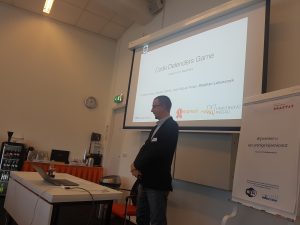
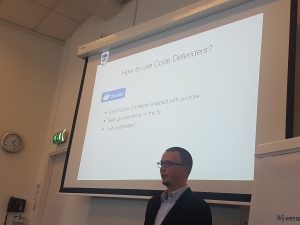
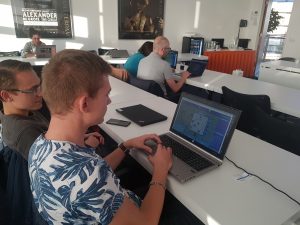
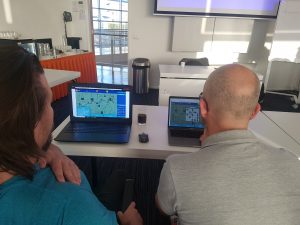
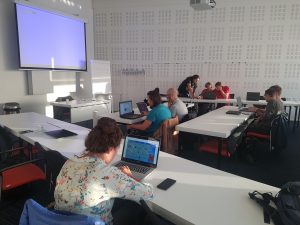
Student Project Symposium, Utrecht, June 2018
About 200 students attended this event where preliminary results of the IMPRESS project were presented. Slides can be found here.
UCM, Madrid, lecture 25th of June 2018
The 25th of June 2018, Tanja Vos, gave a lecture at the UPM about IMPRESS and its objectives. The slides can be found here.
EDUCON2018 – IEEE Global Engineering Education Conference
During the EDUCON2018, Tenerife (Spain) on the 20-21st of april 2018, two presentations were given about the evolution of the H2020 RAGE Analytics platform, including the new IMPRESS requirements. (slides, slides)
ICT OPEN 2018, Amersfoort
IMPRESS project was be presented at the ICT OPEN event that takes place the 19 and 20th of March 2018 in Amersfoort, The Netherlands. Here are the slides.
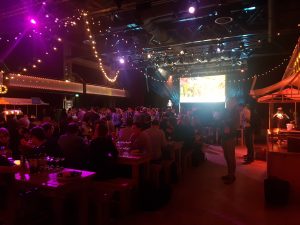
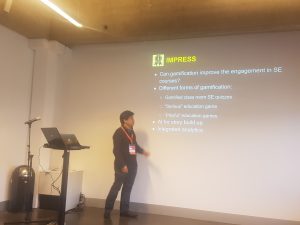
NIOC 2018 – Congres Beleef ICT Onderwijs
During the NIOC 2018 event in Leeuwarden, The Netherlands we presented the IMPRESS project together with some games to give an idea of what the project will achieve. The slides of the IMPRESS workshop are here The Jumble quiz can be replayed from here.
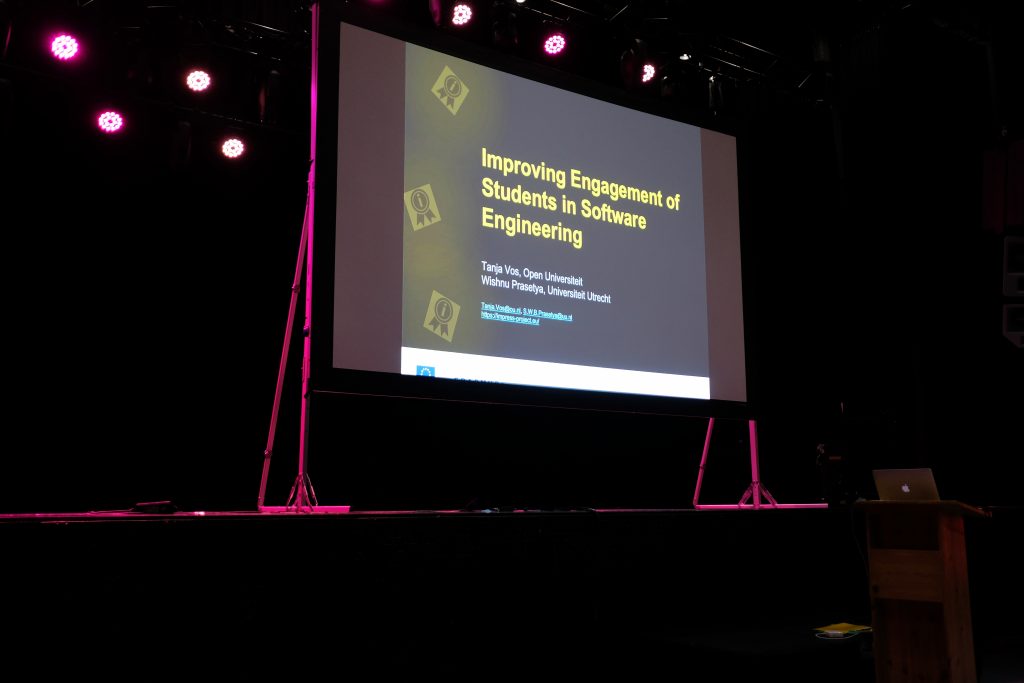
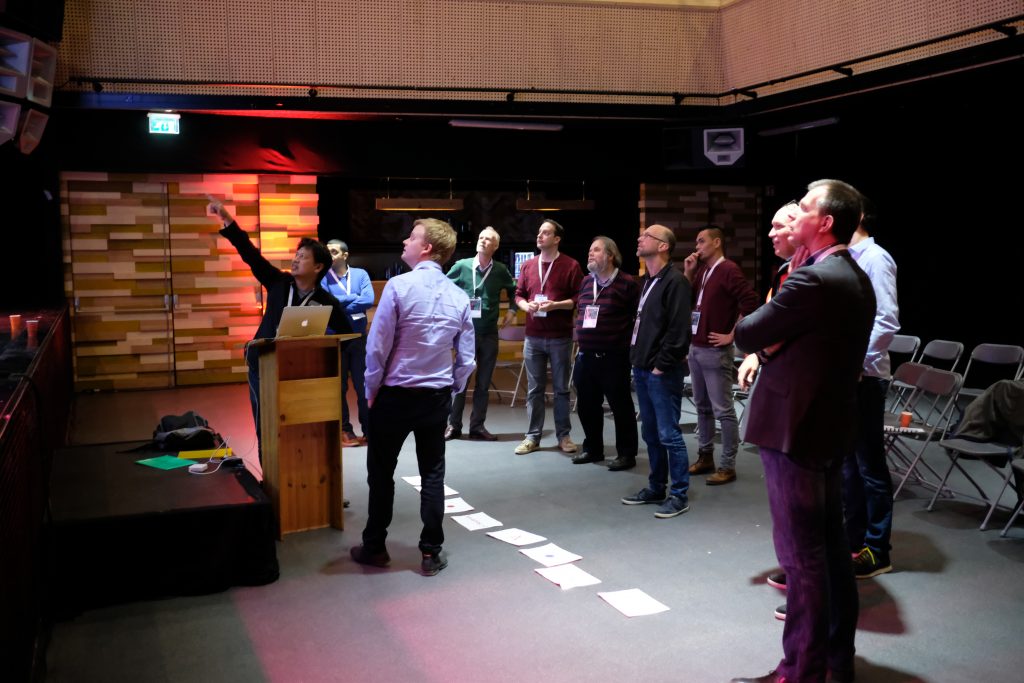
TouW dagen 2017
During the TouW dagen in Amsterdam, The Netherlands 25 november 2017, we used IMPRESS games to disseminate the project and part of the activities that we plan to do in the project. The Kahoot! quiz was about the contents of the talks given during the seminar in Testing.
2017 Joint Conference on Serious Games
During JCSG 2017 in Valencia, Spain on the 24th of November 2017, a keynote speech was given about serious games and analytics where IMPRESS main objectives were introduced and in put into context with other initiatives and EU projects.

